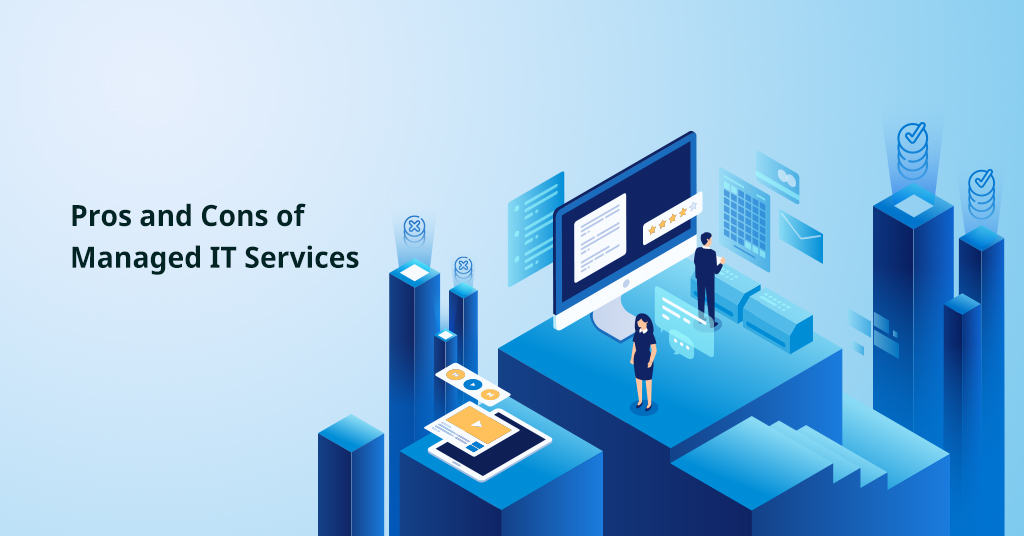The global IT services market was valued at $821.58 billion and is expected to grow at a compound annual growth rate of 9.1% from 2023 to 2030.
Businesses of all sizes rely on data technology to run successfully. As technology advances, so do the needs and issues connected with IT infrastructure management. Remotely managed IT services are one alternative that has gained popularity in recent years.
We will discuss the pros and cons of remote managed IT services. It will help you decide whether they are ideal for your company.
Continue reading to learn more about the pros and cons of remote-managed IT services.
Pros of Remote-Managed IT Services
Remotely managed IT Services have grown in popularity for a sort of compelling reason. It also provides several benefits to organizations of all kinds. Here are some of the main advantages:
Cost Savings
The potential for cost reduction is one of the most appealing benefits of remote-managed IT services. Businesses can avoid the IT costs of employing and training in-house IT professionals. It outsources IT administration to a remote workforce.
It provides flexible pricing structures. It authorizes organizations to pay for the services they need.
Access to Expertise
Remote-managed IT service companies often use a team of qualified individuals with diverse IT knowledge. It implies that firms may have access to a broader range of talents. It also includes expertise that they could afford in-house.
You can look for an IT Consulting company that offers competent employees and high-quality services.
24/7 Monitoring and Support
Many remote-managed IT service companies track your IT infrastructure around the clock. This proactive strategy enables the early detection and repair of issues. It also reduces downtime and ensures the smooth operation of your systems.
Scalability
Remote-managed IT services may scale to meet the demands of your company. Your IT service provider may alter their services to ensure that you always have the right amount of help.
Security Expertise
Cybersecurity is evolving as a rising issue for organizations. Remotely-managed IT service companies specialize in cybersecurity. It also assists your firm in protecting itself from emerging threats.
Access to Cutting-Edge Technology
IT service providers often invest in cutting-edge technology and solutions. Your firm may have access to the most recent innovations in IT infrastructure. It includes software and security without incurring the whole cost.
Geographical Flexibility
Remote-managed IT services may be delivered from anywhere on the globe. It provides organizations with access to a global talent pool. It also allows them to select the best-fit service provider regardless of location.
Disaster Recovery and Backup
Service providers feature strong backup and disaster recovery solutions as part of their offerings. It ensures that your data is safe and that you have a plan to recover in the event of an unexpected catastrophe.
Enhanced Productivity
Workers can focus on their activities without interruptions since IT concerns are resolved by specialists. As a result, overall productivity and staff morale rise.
Cons of Remote-Managed IT Services
Remote-managed IT services provide many benefits. It is vital to evaluate the potential downsides and obstacles. Here are some of the disadvantages of IT services:
Loss of Control
The loss of control over their IT infrastructure is one of the concerns that organizations have when outsourcing IT services. Control over some areas of IT management may be constrained. It also includes decision-making, priority, and the promptness of updates or changes.
Dependency on Service Providers
You become reliant on the service provider’s routine and dependability. If the supplier has technical issues or downtime, it might affect your business operations and productivity.
Data Privacy and Security Concerns
Giving sensitive data and information to an outside service provider can cause privacy and security concerns. Businesses must ensure the service provider abides by all applicable laws and needs. Strong security measures are in place to safeguard data against breaches and cyberattacks.
Communication Challenges
Communication issues may arise because remote IT service providers can operate in various time zones or regions. Businesses may need to adjust to different work schedules and language challenges. Effective contact and coordination become critical.
Limited Customization
Remotely managed IT services offer standardized solutions that cannot match the specific needs of an enterprise. Organizations may need to change their processes and workflows. You have little control over the system because the third party controls the configuration and maintenance settings.
Initial Transition Period
The process of switching to remote-managed IT services can be challenging and time-consuming. Data migration, system configuration, and process adaptation may all be part of it. Normal company activities may be interrupted during this change.
Service Provider Reliability
These are crucial to the success of remote-managed IT services. Your firm may be left poor or interrupted by IT services if the supplier has financial problems or goes out of business.
Hidden Costs
There may be hidden costs connected with service add-ons, unexpected cost adjustments, or fines for exceeding service restrictions. It is crucial to study service agreements to know all possible charges. These costs are neglected or understated.
It also results in budget overruns and financial shocks. It can arise in a variety of circumstances. It also includes corporate operations, client transactions, and building projects.
Absence of on-Site Presence
It may be helpful when diagnosing hardware problems or tackling sophisticated technical challenges that need physical access to equipment. Remote providers may not be able to provide rapid on-site assistance.
Cultural Differences
It can have an impact on cooperation and understanding. Differing work cultures and practices can lead to fallacies or difficulty aligning with your company’s goals.
Understanding the Pros and Cons of Remote Managed IT Services
The decision to adopt remote managed IT services should be based on your organization’s unique priorities and risk tolerance. It can be a valuable solution for many businesses. You can make an educated choice that aligns with your long-term IT strategy and business goals.
Remotely managed IT services have transformed the IT landscape. Their suitability depends on your specific case and goals. Speak to a qualified IT service provider for advice on viable solutions for your managed IT service needs.










